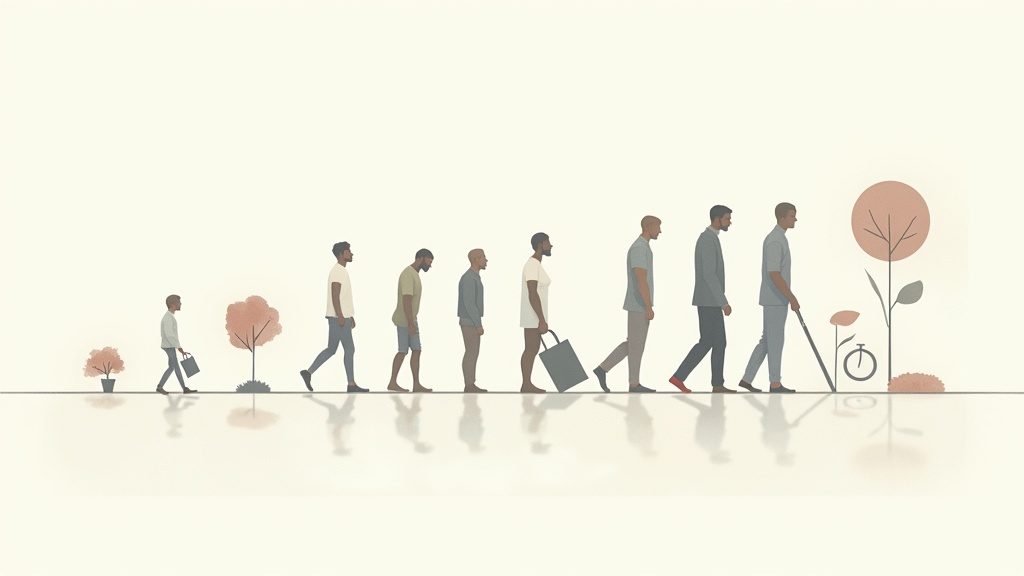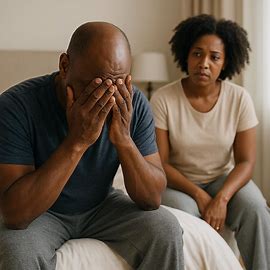Male sexual performance can mix it up as you age. There’s plenty of curiosity around what’s typical during each decade of life. With so much info floating around, it can be tough to separate hype from reality or figure out what’s normal for you. Here, I break down what you can expect from sexual performance at different ages, what factors impact things, and what you can do if you notice any changes.

What Happens to Male Sexual Performance With Age?
Sexual performance describes anything from the ability to get and maintain an erection to stamina to overall satisfaction. For most guys, sexual function naturally goes through a glow-up throughout life. Hormones, lifestyle, health issues, and emotional factors all play a role. Some studies suggest about 40% of men over 40 experience some level of erectile difficulties, but it’s not all downhill. Great sex is possible at any age, especially when you pay attention to the basics.

Understanding what may happen as you get older can help manage expectations and tone down stress. There isn’t a magic age when everything changes. The switch up happens gradually over time. Here’s a closer look by decade.
Male Sexual Performance: Age by Age
In Your 20s
During your late teens and 20s, testosterone is at its peak, and libido tends to be high. Erections are usually strong and happen quickly. Most men in their 20s can recover pretty fast after orgasm (called the refractory period) and may even be able to go multiple rounds in a short time. Performance anxiety or nerves can be more common, especially with new partners or new experiences, but physical capacity is usually on your side. Taking up sports, focusing on nutritious food, and tackling performance anxiety can lay the groundwork for long-term sexual health.
In Your 30s
Testosterone levels start to decrease slightly, but most men won’t notice much change. You might find your recovery time between erections is a bit slower than in your early 20s, but overall sexual performance stays solid. Work, stress, relationships, or parenthood might have more of an impact on sex drive than aging itself at this point. Healthy habits like staying active and keeping to a balanced diet make a big difference. Some men also stumble upon the benefits of focusing more on intimacy and less on performance, setting the stage for deeper connections.
In Your 40s
Testosterone keeps up its slow drop. Some men notice changes like needing more stimulation to get an erection, or erections that aren’t as firm as before. The refractory period might be longer, and interest in sex may dip for some folks. Health issues like high blood pressure or diabetes can also start to make things harder. On the positive side, emotional maturity and sexual confidence often rise, letting many men have more satisfying and eye-catching sex lives. Exploring new experiences or activities with your partner might bring fresh excitement, syncing up emotional connection and desire.
In Your 50s and Beyond
Natural changes become a bit more noticeable. Erections may take longer to develop, be less firm, or not last as long. Chronic health issues, medication side effects, and the ongoing decline in testosterone can reduce libido and performance. Still, a satisfying sex life is very possible. Focusing on communication and intimacy can help keep things fulfilling even if the pace or style of sex changes. At this stage, emotional connection can become a bigger driver of sexual satisfaction. Many couples find that their physical relationship gets a boost through honest conversations and by game planning creative ways to stay close, such as scheduling intimacy or trying new things together.

The Main Factors That Influence Sexual Performance By Age
Sexual function isn’t only about age or testosterone levels. Here’s what else can move the needle, for better or worse:
- Physical Health: Conditions like heart disease, diabetes, obesity, and high blood pressure make it harder to get or keep an erection. Regular exercise can tone down that risk, and putting sleep first keeps your whole system working smoothly.
- Mental Health: Anxiety, depression, stress, and low self-esteem all get involved. Mental well-being is super important for sexual health, and talking about concerns often helps. Mindfulness or relaxation techniques can give a boost to arousal and pleasure.
- Lifestyle: Smoking, heavy drinking, and lack of movement are linked with lower sexual performance at any age. Eating nutritious foods, moving your body, and cutting back on alcohol make a real difference. Tracking down new hobbies or social activities can reduce stress and set a more positive tone outside the bedroom.
- Medication Effects: On average, guys are prescribed more meds over time, many of which (like antidepressants and meds for high blood pressure) can affect arousal and erections. Bringing medication questions up with your healthcare provider makes it easier to find a game plan that doesn’t block your sexual health.
- Relationship Satisfaction: Connection and communication with your partner play a major role. A positive emotional relationship can step up desire and satisfaction at any age, since feeling understood and appreciated supports overall well-being.
Common Changes and How to Handle Them
It’s normal to notice gradual changes in sexual response as you age. Recognizing what’s going on and how to deal with it takes a lot of worry out of the equation.
- Longer Time to Erection: Slower response doesn’t mean something’s wrong. Extra foreplay and reduced stress help, and sometimes just a change in routine can make things interesting.
- Softer Erections: This can happen with age or health changes, or after a period of less frequent sexual activity. Talk honestly with partners and stay active for better circulation. Certain positions may help as well.
- Reduced Sensitivity: Feeling less intense sensation is common. Mix in some variety by experimenting with positions, pace, or adding sex toys; some men also benefit from pelvic floor exercises.
- Lower Libido: When desire isn’t what it used to be, physical activity, solid sleep habits, and stress reduction are worth trying. Sometimes, focusing on nonsexual closeness reignites desire at a later time.
- Changes in Orgasm: Orgasms may be less intense or involve smaller amounts of fluid as you age. This is normal and doesn’t mean anything is wrong. Enjoying the build-up and not rushing adds to satisfaction.
If you notice sudden or ongoing problems with erections, pain, or rapid changes in desire, it’s smart to check in with a healthcare provider. Sometimes, these issues point to deeper health problems like heart disease or diabetes.
Staying Sexually Healthy As You Age: Practical Tips
Getting a boost in sexual health doesn’t require extreme changes. The basics go a long way, even if you’re noticing shifts as you get older. Here are some things I find really helpful:
- Move More: Activities like walking, swimming, or strength training keep your body tuned up and support hormones that play a part in sexual health and desire.
- Eat Well: Heart-healthy foods like leafy greens, nuts, salmon, and berries boost the same circulation that supports erections.
- Prioritize Sleep: Tiredness hits libido and mood hard—aim for seven to nine hours per night for better energy, focus, and desire.
- Cut Down Smoking and Drinking: Smoking and excessive drinking mess with nerves and blood vessels involved in sexual response. Cutting back or quitting helps, sometimes more than expected.
- Communicate Openly: Honest chats with your partner about needs and worries smooth the way and take a lot of the pressure off. Sharing fantasies or concerns can make intimacy stronger.
- Don’t Ignore Mental Health: If anxiety or depression are getting in the way, reaching out for support can do wonders, not just for sex but for mood and life overall. Self-care and professional help are both options.

Things to Think About Before Getting Help
Figuring out when to seek extra support is a common question. Here are a few things to mull over before booking that appointment:
- Sudden Changes: Quick shifts in performance, especially if paired with pain, might signal an underlying medical issue that needs checking out, so don’t wait too long to chat with a professional.
- Feeling Stressed or Anxious: Sometimes, a cycle of worry about performance actually makes things harder. If this sounds familiar, talking with a therapist or doctor can help break the cycle and build confidence.
- Partner Concerns: If sexual changes create stress in your relationship, a sex therapist or couples counselor could help both people feel heard and understood, resetting expectations and opening new chapters of connection.
There’s no shame in wanting to step up your sexual health. Even just a few small changes can set you back on track. Plenty of men see improvements just by tweaking sleep, eating, exercise, or communication habits. Working with a professional isn’t a sign of weakness—sometimes it’s the key to real happiness and connection.
Beyond Performance: How Sex Changes Might Affect Daily Life
Switching up sexual function isn’t just about pleasure. It can impact confidence, relationships, and how you feel about yourself overall. Some men feel worried about getting older or think their relationships will suffer if sex changes, but there’s plenty of good news. Others track down that with less anxiety around performance, intimacy and closeness actually get even better. Letting go of pressure and focusing on mutual satisfaction often leads to deeper happiness.

Solo sex (masturbation) remains totally normal and healthy at any age. It can help you stay in tune with what feels good, reduce stress, and make it easier to spot changes as they come along. Exploring new techniques or fantasies is also a fun way to keep things interesting and boost your confidence.
Men in committed relationships often find their sex lives improve with open communication and a little adaptation. Partners tend to adjust together, so staying on the same page makes sexual connection a whole lot easier. Touch, intimacy, humor, and trying new things together can keep passion alive today and into the future.
Frequently Asked Questions
These are some questions I hear regularly when chatting about male sexual performance and aging:
Question: Is it normal for my sex drive to decrease as I get older?
Answer: A gradual drop in libido as you age is pretty common, but there’s no set age for this to happen. If the change is sudden or causing you distress, it’s worth checking in with a healthcare professional.
Question: Will exercise or diet really help my sexual performance?
Answer: Yes. Regular activity and balanced nutrition support the same systems that power sexual performance. Even small improvements in fitness or eating habits can help you feel better and more confident.
Question: Can medications affect my sex life?
Answer: Many common meds, including those for high blood pressure, depression, or cholesterol, can influence libido or erectile function. Always talk to your doctor before stopping or changing any meds, and don’t be shy about asking questions—there might be alternatives or solutions available.
Wrapping Up

Male sexual performance changes with age, but there’s plenty you can do to stay satisfied and healthy. Looking at the whole picture—physical health, mental well-being, relationships, and open communication—makes it easier to feel good at every stage of life. Little tweaks to your habits, honest conversations with your partner, and reaching out for help when needed really make a difference for your long-term sexual health and happiness. Remember, sexual wellness is about much more than performance; it’s about connection, confidence, and feeling good in your own skin.
Here’s a little transparency: Our website contains affiliate links. This means if you click and make a purchase, we may receive a small commission. Don’t worry, there’s no extra cost to you. It’s a simple way you can support our mission to bring you quality content.”
Comments Below

This article is a thoughtful, well-researched guide that treats male sexual health with the respect it deserves. Byron, you’ve created a space where aging is not feared but understood — where performance is reframed as connection, confidence, and care. Your mix of science, empathy, and practical advice makes this a valuable resource for men at every stage of life.
Un guide réfléchi et bien documenté qui aborde la santé sexuelle masculine avec justesse et respect. Byron, tu offres un espace où le vieillissement n’est pas redouté mais compris — où la performance devient synonyme de lien, de confiance et d’attention. Ton mélange de science, d’empathie et de conseils concrets fait de ce billet une ressource précieuse pour les hommes à chaque étape de leur vie.
Lanicheduclip
Once again, you’ve humbled me. I spend a lot of time researching information on this subject and combine it with my own life experiences; I try to get that into my writings. Hopefully, it helps all men and even women.
Level-headed overview—appreciate how you frame performance as a spectrum, not a scoreboard. What’s moved the needle for me has been boring foundations: sleep, strength work, stress management, and a check on cardio and hormones with my doctor. Pelvic-floor training and reducing alcohol helped more than any “miracle” supplement.
Two quick Qs: which age-range benchmarks in your post are drawn from population data vs expert consensus, and do you have a simple decision rule for when to see a clinician (e.g., sudden change, morning erections disappearing, comorbidities)? Also, curious how you weigh evidence for popular supplements against first-line lifestyle and CBT-style approaches.
Marios
The data is drawn from both Large-Scale Population Data and Expert Consensus reporting.
Deciding when to consult a doctor depends on the frequency, severity, and suddenness of the changes you experience. A simple rule of thumb can be applied: see a clinician if a sexual performance issue becomes persistent, bothersome, or is associated with other health changes. Specific Examples:
Sudden onset of ED
Persistent or frequent issues: While occasional erectile difficulty is normal, if it happens more than 25% of the time, or is present for three months or longer, you should seek medical advice.
Disappearance of morning erections
Associated with other health problems: heart disease, it is crucial to see a doctor if you have other risk factors, such as high blood pressure, diabetes, high cholesterol, or obesity.
As far as the weight put on “popular supplements against first-line lifestyle and CBT-style approaches”, I elieve that is up to each individual. However, there is reports on them.
Lifestyle changes: This approach is strongly supported by evidence. A large-scale meta-analysis confirmed that positive changes—including weight loss, increased physical activity, smoking cessation, and moderate alcohol use—are correlated with better sexual function.Psychological interventions (CBT): For ED with a psychological component (such as performance anxiety), therapies like CBT and sex therapy have a strong evidence base. Studies show they can be as effective as oral medications for men with non-organic ED and can enhance outcomes when combined with medication.
Supplements (mixed evidence)
Supplements (mixed evidence)
Limited evidence for efficacy
Promising but unproven: Some supplements, like L-arginine and Korean red ginseng, have shown some modest positive effects in mild to moderate cases of EDQuality control issues: Unlike prescription medications, supplements are not strictly regulated by the FDASupplements vs. medication: Reputable medical organizations emphasize that no supplement has been proven as effective as prescription medications like Viagra (sildenafil) or Cialis (tadalafil), which have robust clinical data and regulatory approval. Mario, have another post on this subject but you always have the most interesting questions, so I couldn’t resist sharing some of my ongoing research.Always a pleasure, my friend, to share with you.